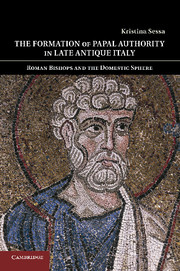Book contents
- Frontmatter
- Contents
- Acknowledgments
- Abbreviations
- Map Late Roman Italy
- Roman Bishops from Peter to Gregory I
- Introduction: Household Management and the Bishop of Rome
- Chapter 1 The Late Roman Household in Italy
- Chapter 2 From Dominion to Dispensatio: Stewardship as an Elite Ideal
- Chapter 3 Primus Cultor: Episcopal Householding in Theory and Practice
- Chapter 4 Overseeing the Overseer: Bishops and Lay Households
- Chapter 5 Cultivating the Clerical Household: Marriage, Property, and Inheritance
- Chapter 6 Mistrusting The Bishop: Succession, Stewardship, and Sex in the Laurentian Schism
- Chapter 7 The Household and The Bishop: Authority, Cooperation, and Competition in the Gesta Martyrum
- Conclusion
- Bibliography
- Index
Chapter 2 - From Dominion to Dispensatio: Stewardship as an Elite Ideal
Published online by Cambridge University Press: 05 December 2011
- Frontmatter
- Contents
- Acknowledgments
- Abbreviations
- Map Late Roman Italy
- Roman Bishops from Peter to Gregory I
- Introduction: Household Management and the Bishop of Rome
- Chapter 1 The Late Roman Household in Italy
- Chapter 2 From Dominion to Dispensatio: Stewardship as an Elite Ideal
- Chapter 3 Primus Cultor: Episcopal Householding in Theory and Practice
- Chapter 4 Overseeing the Overseer: Bishops and Lay Households
- Chapter 5 Cultivating the Clerical Household: Marriage, Property, and Inheritance
- Chapter 6 Mistrusting The Bishop: Succession, Stewardship, and Sex in the Laurentian Schism
- Chapter 7 The Household and The Bishop: Authority, Cooperation, and Competition in the Gesta Martyrum
- Conclusion
- Bibliography
- Index
Summary
For there is not one of your slaves, male or female, for whom you may believe that you will not have to render an account before God. For to this end mortals were made masters over other mortals, that they might receive the care of the image of God during his sojourn in the world and might keep safe the riches destined for souls, which daily the plunderer of all that is good troubles himself to snatch away…By this exemplum you will secure your own salvation and that of those over whom you have been worthy to rule.
During late antiquity, christian householders in italy were asked to reconceive their authority. Authors such as the anonymous writer of the Ad Gregoriam in palatio, a late fifth- or early sixth-century Christian conduct manual for matronae, exhorted householders to envision their administration in terms of dispensation rather than dominion. They were to behave not as earthly lords and property owners but as God's most trusted earthly agents. As stewards placed by God in supervisory roles over his property and people, they were to undertake household tasks with a view toward final judgment.
Many Christian thinkers understood oikonomia as a form of stewardship, that is, as a discourse of salvation oriented around the earthly householder's temporary and solicitous oversight of God's land and people. Scholars have long discussed stewardship as a distinctly Judeo-Christian conception of wealth management that posited material property as God's possessions. The focus on material wealth is certainly warranted by the sources. As this passage from the Ad Gregoriam shows, Christian moralists emphasized the financial component of stewardship, especially regarding the use of riches to care for the poor. Stewardship and assistance to the socially dislocated (e.g., the poor, orphans, widows) were closely intertwined in late antique religious thought on oikonomia.
- Type
- Chapter
- Information
- The Formation of Papal Authority in Late Antique ItalyRoman Bishops and the Domestic Sphere, pp. 63 - 86Publisher: Cambridge University PressPrint publication year: 2011



